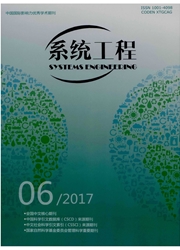

 中文摘要:
中文摘要:
研究零售商公平偏好行为对供应链各成员定价和营销行为的影响。假设零售商负责营销努力,分别研究了零售商不利不公平厌恶和有利不公平厌恶两种情形,并且将所得结果和零售商风险中性且无不公平厌恶的情形进行对比。研究结果表明:零售商的公平偏好行为对批发价格、零售价格和营销努力水平都有较大影响,零售商的不利不公平厌恶行为一定程度上增加了其谈判能力,随着其厌恶程度的增加,零售商与制造商的利润比增大,而零售商的有利不公平厌恶则作用刚好相反。最后进行算例分析,并给出一些管理意义。
 英文摘要:
英文摘要:
This paper studies the influences of retailer's fairness preference on the pricing of the supply chain members, and on the marketing behavior. Assuming the retailer exerts the marketing efforts, we investigate the following two cases, i, e. , the retailer has the adwmtageous inequity aversion and the disadvantageous inequity aversion. Then, we compare the results under the inequity aversion cases with the case that the retailer is risk neutral and there's no inequity aversion. The results show that the retailer's fairness preference has a great influence on the wholesale price, the retail price and the marketing effort level. To some extent, the retailer's disadvantageous inequity aversion behavior increases the bargaining power of the retailer. As the inequity aversion degree increases, the profits ratios of the retailer and the mauufacturer increase. However, the advantageous inequity aversion behavior has the opposite effect. A numerical example is given in the end, and we derive some managerial implications.
 同期刊论文项目
同期刊论文项目
 同项目期刊论文
同项目期刊论文
 An Adaptive Hybrid Algorithm Based on Particle Swarm Optimization and Differential Evolution for Glo
An Adaptive Hybrid Algorithm Based on Particle Swarm Optimization and Differential Evolution for Glo A decision model of optimal production reliability and warranty length in animperfect production sys
A decision model of optimal production reliability and warranty length in animperfect production sys Contract design for two-stage supply chain coordination: Integrating manufacturer-quality and retail
Contract design for two-stage supply chain coordination: Integrating manufacturer-quality and retail A decision model of optimal production reliability and warranty length in an imperfect production sy
A decision model of optimal production reliability and warranty length in an imperfect production sy 期刊信息
期刊信息
